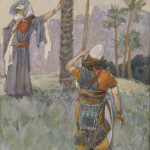Yesterday I preached on the Lord’s parable of the minas from Luke 19, about the good servants who traded their master’s money and made more, and the bad servant who hid his master’s money and did not gain from it. (Sermon audio is available here.) It’s fairly clear from the context that in telling the parable, the Lord was not advocating his disciples give up the life of service and instead become shrewd silver traders. But according to John Nolland in his commentary on Luke, it’s not 100% clear what exact message the Lord was trying to get across in this parable:
Do we have here a general commendation of the virtues of fidelity and effort as necessary for the person who would enter the kingdom of God (Jülicher)? Or do we have an attack on the preservers of the Jewish religious tradition, who have preserved it essentially intact, but not, according to Jesus, made profitable use of it for God (Jeremias)? Or is an attack made on the fear-centered, and therefore legalistic, approach to religion of those whom Jesus attacks (Dupont)? Or do we have a challenge to disciples to make fruitful for God what has now come to them from Jesus (whether this is to be seen more generally, or applied to something as focused as the spreading of the message [Weiser; Weder; Didier]) ? Or does the rule of God as revealed by Jesus seem to the scribes and Pharisees to ask too much, and the parable describes their revolt against it (Lambrecht)? Or is the challenge to respond to the message of the kingdom with the dynamism of a bold readiness to risk all, and not to take refuge in a sterile security (Tàrrech)?
The interpretation in my sermon is drawn from passages in Arcana Coelestia and Apocalypse Revealed, particularly the following:
He who laid up the mina in a napkin means those who procure for themselves the truths of faith but do not conjoin them with the goods of charity, and so have no gain or fruit from them. (AC 5291)
By trafficking and trading is signified in the Word to procure for themselves spiritual riches, which are the knowledges of truth and good, and in the opposite sense the knowledges of falsity and evil; and to gain the world by the latter, and to gain heaven by the former. (AR 759)
From the signification of “city” it may appear what is meant by cities in [the parable of the minas]. By “cities” here, also, doctrinal things or truths of doctrine are signified, and by “[the servants] being over them” is meant to be intelligent and wise, thus to give “authority over them” is to give intelligence and wisdom; “ten” signifies much, and “five” something. (AR 194)
That last point in particular is something I wish I’d made a little clearer – that authority over cities signifies wisdom because cities represent a whole body of doctrinal knowledge – but I wasn’t sure how to make that point without going off track and losing the attention of the many kids in attendance. Anyway, again, sermon audio is here.
(Image of Jewish shekel from Classical Numismatic Group, Inc. http://www.cngcoins.com)











